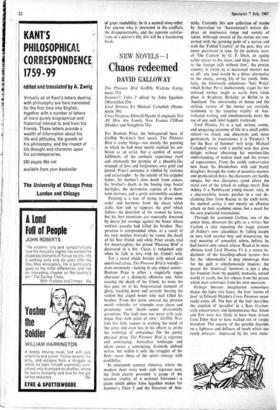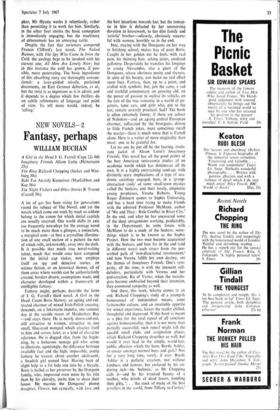NEW NOVELS-1
Chaos redeemed
DAVID GALLOWAY
Summer's Tales 3 edited by John Iggulden (Macmillan 25s) Lord Dismiss Us Michael Campbell (Heine- mann 30s) Cross Purposes Edward Hyams (Longmans 21s) All Men Are Lonely Now Francis Clifford (Hodder and Stoughton 21s) For Brenton Price, the beleaguered hero of Griffith Watkins's first novel, The Pleasure Bird is many things—not merely the painting in which he had most nearly realised his am- bition as an artist, but a symbol of sexual fulfilment, of the aesthetic experience itself and ultimately the promise of a phoenix-like triumph of love and forgiveness over grief and hatred. Price's existence is riddled by violence and catastrophe: by the suicide of his crippled father, his mother's slow death from cancer, his brother's death in the boxing ring, brutal fist-fights, the destructive caprice of a short- term mistress, and a grisly automobile accident.
Painting is a way of trying to draw some order and harmony from the chaos which stalks him and to suppress the grief which follows the desertion of the woman he loves; but his best intentions are repeatedly thwarted by desire ,for revenge against the boxer whose ruthless assaults had killed his brother. Des- peration is compounded when, as a result of his own reckless bravado, he causes the death of his best friend, and while Price awaits trial for manslaughter, the prized 'Pleasure Bird' is destroyed in a fire. Chaos is redeemed only when he falls in love with his friend's wife.
For a novel which bristles with moral and emotional crises, The Pleasure Bird is weirdly— even ominously—lacking in any ethical centre: ' Brenton Price is either a singularly vague character or a distinctly offensive one. After causing the death of his friend, he none the less goes on to his long-awaited moment of glory, tracking down and severely beating the violent but stupid boxer who had killed his brother. From this point onward the phoenix motif—whereby art triumphs over chaos and pregnancy over death—seems distastefully gratuitous. The fault may rest more with tech- nique than with point of view : Griffith Wat- kins has little success in evoking the mind of the artist and even less in his efforts to probe the workings of conscience. On the purely physical plane The Pleasure Bird is vigorous and convincing; Australian landscape and idiom create a convincing, distinctly defined milieu, but within it only the struggles of the flesh—never those of the spirit—emerge with credibility.
In nineteenth century America, where the modern short story took such vigorous root, the form clearly provided 'a gauge of the creative vitality of a national literature'—a claim which editor John Iggulden makes for Summer's Tales 3 and the literature of Aus-
tralia. Certainly this new collection of stories by Australian (or 'Australasian') writers dis- plays an impressive range and variety of talent. Although several of the stories are con- cerned with the growing pains of a nation and with the 'Fabled Country' of the past, they are never provincial in tone. In the pathetic story of -The Captain' by G. F. Dean, an ageing sailor retires to the shore, and ships now 'leave to the foreign calls without him'; the precise country in which' he is marooned matters not at all: any land would be a bitter alternative to the exotic, roving life of his 'youth. Simi- larly, the hilariously calamitous 'Saki Wake' which Esther Petit inadvertently stages for her unloved mother might as easily have taken place in Brighton, Berkeley or Berlin as in - Auckland. The universality of theme and the stylistic variety of the stories are certainly testimony to the 'creative vitality' of Aus- tralasian writing, and simultaneously make the use of any such label happily irrelevant.
Lord Dismiss Us is a sad, serious, comic, and unsparing anatomy of life in a small public school—its rituals and obsessions and, more particularly, its frustrations; it is Thomas's 'I See the Boys of Summer' writ large. Michael Campbell writes with a zestful ease that gives delight without obscuring his martinet-like understanding of human need and the terrors - of separateness. From the archly conservative new- head, his blunderbuss wife and bratty daughter, through the ranks of eccentric masters and pranksterish boys, the characters are hardly unique, but two characters stand above the usual cast of the school or college novel. Eric Ashley is a flamboyant young master who, in a characteristic lesson, perches in a tree de- claiming lines from Racine to the sixth form; his method acting is not merely an effective attack on their academic ennui, but a mask for his own profound frustrations.
Through his assistance Carlton, one of the senior boys, discovers' his gifts as a writer, but Carlton is also repeating the tragic pattern of Ashley's own schooldays by falling deeply in love with another boy and discovering the -teal meaning of sensuality where, before, he ' 'had known only sexual release. Read at its most obvious level Lord Dismiss Us is a severe' in- dictment of the boarding-school system—less for the 'abnormality' it may encourage than for the guilt it simultaneously inspires; the prayer for 'dismissal,' however, is not a plea for• freedom from the painful, monastic, unreal world of youth, but for release from the prison . which man constructs from his own emotions.
Perhaps because imagination somewhere makes the lapse into fancy, the four 'stories of love' in Edward Hyams's Cross Purposes never really come off. The best of the four describes the creation of 'paradise' in a Kew Garden- style conservatory and demonstrates that Adam and Eve were less likely to have been driven from Eden than to have walked out in simple' boredom. The success of the parable depends on a lightness and deftness of touch which too rarely _emerges: impressed by his own meta- phor, Mr Hyams works it relentlessly, rather than permitting it to work for him. Similarly, in the other four stories the basic conception is immediately engaging, but the machinery of denouement has an annoying rattle. - Despite the fact that reviewers compared Francis Clifford's last novel, The Naked Runner, with The Spy Who Came in from the Cold, the analogy begs to be invoked with his current one, All Men Are Lonely Now; but in this instance the cold has grown, if pos- sible, more penetrating. The basic ingredients of this absorbing story are thoroughly conven- tional: a laser-guided missile, purloined documents, an East German defection, et al., but the twist is as ingenious as it is adroit, and it depends to a degree which few thrillers do on subtle refinements of language and point of view. To tell more would, indeed, be 'telling.'







































 Previous page
Previous page